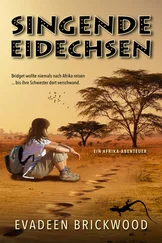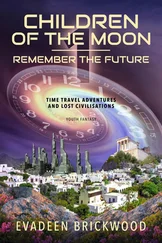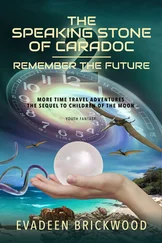Evadeen Brickwood - Singing Lizards
Здесь есть возможность читать онлайн «Evadeen Brickwood - Singing Lizards» — ознакомительный отрывок электронной книги совершенно бесплатно, а после прочтения отрывка купить полную версию. В некоторых случаях можно слушать аудио, скачать через торрент в формате fb2 и присутствует краткое содержание. Жанр: unrecognised, на немецком языке. Описание произведения, (предисловие) а так же отзывы посетителей доступны на портале библиотеки ЛибКат.
- Название:Singing Lizards
- Автор:
- Жанр:
- Год:неизвестен
- ISBN:нет данных
- Рейтинг книги:5 / 5. Голосов: 1
-
Избранное:Добавить в избранное
- Отзывы:
-
Ваша оценка:
- 100
- 1
- 2
- 3
- 4
- 5
Singing Lizards: краткое содержание, описание и аннотация
Предлагаем к чтению аннотацию, описание, краткое содержание или предисловие (зависит от того, что написал сам автор книги «Singing Lizards»). Если вы не нашли необходимую информацию о книге — напишите в комментариях, мы постараемся отыскать её.
Singing Lizards — читать онлайн ознакомительный отрывок
Ниже представлен текст книги, разбитый по страницам. Система сохранения места последней прочитанной страницы, позволяет с удобством читать онлайн бесплатно книгу «Singing Lizards», без необходимости каждый раз заново искать на чём Вы остановились. Поставьте закладку, и сможете в любой момент перейти на страницу, на которой закончили чтение.
Интервал:
Закладка:
There were virtually no street signs, but many side roads. Tony’s Toyota was in the repair shop and I couldn’t even drive to the Botsalo to phone the Tuli Block game lodge. Tony didn’t have the time or inclination to accompany me there in a cramped minibus.
And what if the car broke down? One couldn’t ask direction with ‘Dumela mma’ .
Not even Claire had to drive through muddy roads and she had been on her way to the reservation. I was scared. The risk that I could lose my way was just too great. Again I had to wait.
Much to my parents’ relief, I reported that there were no gun battles or bomb blasts anywhere. The only guns I knew about hung over the shoulders of soldiers at roadblocks.
I missed Claire the most! She would have had some idea what to do. She would not have waited. I was already being as brave as I dared to be.
A small valley marked the boundary behind the housing complex. Because of all the high fences, one had to leave the complex and pick a narrow path back to a good spot in order to get an unobstructed view. I often day-dreamed that somewhere behind the hills, I would find Claire one day. Soon.
In the meantime we needed food and I had to walk to the shops. The long road from the training centre to the ‘mall’ was newly tarred, but took a wide berth around the village. Not a speck of shade from the blistering sun and the oily tar got stuck to shoes.
It was better to take the shortcut between trees and motsetsi-kraals. Even if it meant wading through deep grey sand. A trip I wouldn’t recommend barefoot. The sand was too hot and there were sharp objects hiding in it.
To my disappointment, Palapye did not have a traditional market place. The only thing that resembled a village hub was the short row of brick houses we called the mall. The Botsalo Hotel was far away, on the other side of the many kraals.
The only two shops were a greengrocer, where one could purchase mainly cabbage, spinach and squash and a little corner market that offered the mere basics. Bread, Crosse and Blackwell mayonnaise and long-life milk.
Next door was the local shebeen. A sort of pub, where one could eat a bite. Tswanas went to shebeens mostly for the sorghum beer.
Neo Moletsane had invited us proudly to try the local specialty of pap and fatty boiled meat with tomato relish.
We sat down at one of the wobbly tables covered in brightly patterned oil cloth. The food he ordered was served on tatty plastic plates with beetroot salad and none too clean knives and forks.
I was no fan of fatty meat and stuck to the pap and beetroot. I had to try hard not to spit out the unusual-tasting sorghum beer. Neo noticed how I was struggling and ordered a coke.
My shopping trip to the mall ended pleasantly when Alfred, who was on his lunch break gave me a ride back to the complex.
When the car was in running-order again, Tony took me to Serowe and Selebi Phikwe to stock up. There were real supermarkets! With fridges and one could buy fresh milk and produce.
“Finally,” I moaned. “I’m tired of tinned food.”
“That’s why we need cooler boxes. In the heat, lettuce can boil to mush in no time. Like cooked spinach.”
“Crummy. And instead of yoghurt we end up with cheese cake.”
“Exactly. Although that wouldn’t be so bad.”
“Claire loves cheesecake.”
“Mhm.”
That was all he said. Nice try, Bridget. How long would he carry on like this?
Tony wasn’t in a bad mood or anything , so after the shopping, we went to the Museum of Tswana Culture. The gate to the modest building was locked, despite a sign declaring that the museum would be open on a Saturday. Tony asked a few passersby, who spoke broken English and told us that the director of the museum lived around the corner. They offered to fetch him and soon he came running.
“I didn’t expect any tourists at this time of year,” the director apologized.
I began to like the flexibility of rules. In Britain, if a museum was closed, it was closed. End of story.
“Just look at that Tony, what is it?”
I was fascinated by the small wooden animal statues made by the Khoi San. A small wooden board with flattened nails that could be played with one’s thumbs lay on a pedestal.
“That’s a bushman piano,” explained the director, “all hand-carved by Bushmen from the Kalahari Desert.”
Bushmen. I had read about bushmen.
Still out of breath, the man took his position behind the counter and charged us two Pulas entrance fee per head. A group of Americans had also found their way to the museum and queued behind us.
“Awesome man. They have a museum in the middle of the desert, hey Bob?”
“Yeah, wonder if this statue’s for sale. I still need a birthday present for Meg.”
After viewing the exhibition of huts, cooking vessels made from clay and grass, the museum director told us everything there was to know about Tswana beer making. The Americans oohed and aahed and took lots of photographs.
“Beer - that’s my kinda thing, hey Bob?”
Next, we stopped for lunch at a cheerfully painted restaurant on Serowe’s dusty thoroughfare. The place was run by a sweaty Scotsman and his fat Tswana wife. We had a simple meal of hearty stew and samp, a mash of whole white maize kernels.
Surprisingly tasty.
We sat by a large window with the best view of Serowe. The view consisted of a great number of houses painted in shades of pink and green. Donkey carts plodded along at snail’s pace between hooting motor cars.
Babies were strapped to their mothers’ backs in bath towels. The women dawdled along the road in the middle of the traffic chaos. Serowe wasn’t the bustling African market place I had imagined, either. What was Bobonong like, I wondered, and the Tuli Block? I shouldn’t get distracted too much from my mission in Botswana.
But I did get distracted.
Tony and I were invited to barbecues, which were called braais around here. Our hosts were mostly South African contractors, who worked at the mine in Selebi Phikwe. An American teacher, who lived in a hippie-style house in the hills, far from the main road was our most unusual host.
Of course, everybody thought that I was Tony’s girlfriend and we were teased mercilessly about not being hitched yet.
Women were either wives or fiancées in this close-knit society. Not twin sisters of missing girlfriends. We kept quiet and smiled.
People in Southern Africa — black or other-skinned — were rather hospitable. They were also rather religious. In a Christian sense.
On weekends, Tswanas could be seen wearing long robes and church ‘uniforms’. They congregated underneath large trees, singing, drumming.
Purple was for Catholics and white and green for apostolic church members. Groups of women in bright red garb would often meet at bus stops, but I never found out to which church they belonged. Some of the white women wore white doilies on their heads on their way to church. Astonishing.
The season was moving into early summer and I soon learned the importance of wearing sun block and a hat during the day. My arms had turned an angry red after hiking to a deserted settlement, once built in the hills west of Palapye for the McAlpine Company. I could feel that my face and neck didn’t look much better and it took a good few days, before my skin started to peel. A painful lesson.
As time dragged on, I wondered, if it was wise to be so secretive about my identity. Perhaps someone had information about Claire’s case and would have told me. But it was too late to change my story now. There had to be another way.
I should be making contact with Gaborone. The central police head quarters and the British High Commission. Just that communication with Gaborone was still difficult.
Читать дальшеИнтервал:
Закладка:
Похожие книги на «Singing Lizards»
Представляем Вашему вниманию похожие книги на «Singing Lizards» списком для выбора. Мы отобрали схожую по названию и смыслу литературу в надежде предоставить читателям больше вариантов отыскать новые, интересные, ещё непрочитанные произведения.
Обсуждение, отзывы о книге «Singing Lizards» и просто собственные мнения читателей. Оставьте ваши комментарии, напишите, что Вы думаете о произведении, его смысле или главных героях. Укажите что конкретно понравилось, а что нет, и почему Вы так считаете.












